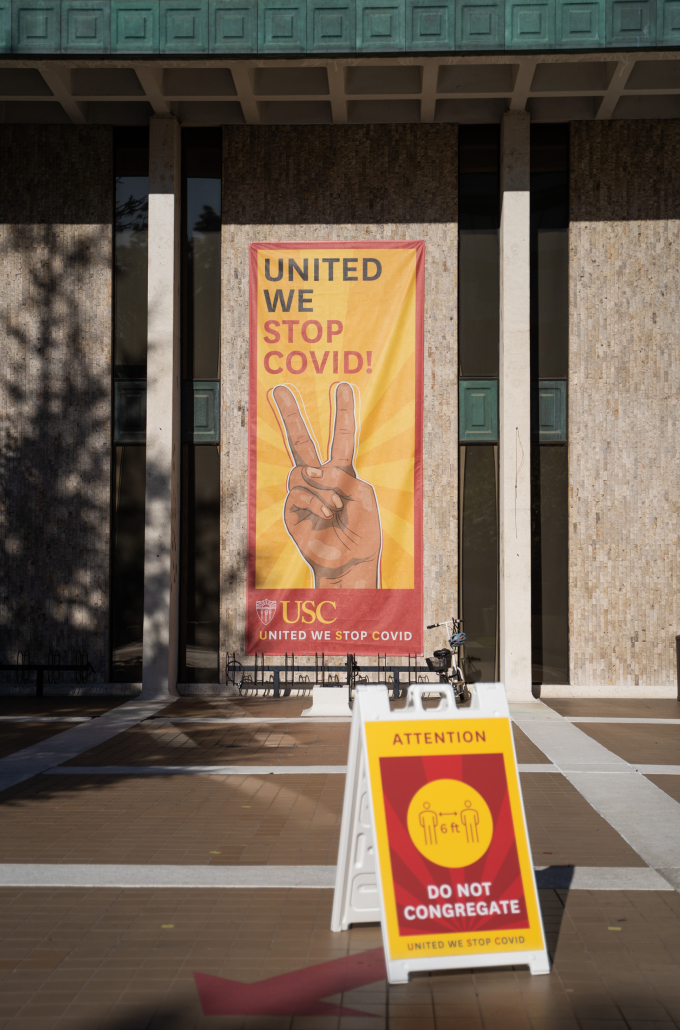University to mandate flu vaccinations

USC will mandate influenza vaccinations for the second year in a row amid the upcoming flu season, Student Health announced in a campuswide email Tuesday. Students, faculty and staff must receive and submit proof of vaccination by Nov 1.
All students who live in University-owned housing or take in-person classes must present proof of influenza vaccination by submitting their immunization record to the MySHR portal. However, students who both reside in off-campus residences and take classes remotely are not subject to the mandate but remain strongly encouraged to be inoculated against influenza.
“This requirement will help mitigate the potential simultaneous impact of flu and COVID-19 during the seasonal flu time frame in the fall [and] winter months,” Chief Health Officer Sarah Van Orman wrote in the memo. “Exact timing of flu season may vary, but activity often begins to increase in October [and] typically peaks between December and February.”
According to the announcement, the flu shot will be enforced by the Trojan Check wellness assessment. USC Student Health is also prepared to ensure broad vaccine access for all students to complete their shot by the Nov. 1 deadline, Van Orman said in a student media briefing Tuesday.
“We’re going to have flu shots at all the testing sites,” Van Orman said. “We’re hoping most people will get their flu shot when they come [for their coronavirus] test -— so you don’t need an appointment for that.”
While flu vaccines will be available at all USC-sponsored testing sites, Van Orman said students are welcome to receive their shot at outside pharmaceutical retail stores. The CVS located inside USC Village Target provides free flu vaccines to students through scheduled and walk-in appointments.
Of the 34,161 tests administered last week, 47 students and three employees tested positive for the coronavirus. The 0.18% positivity rate among students declined steadily since the beginning of the fall semester. Similarly, the staff positivity rate stands at 0.24% — a decline from the 0.3% reported last week.
Van Orman said she is encouraged by consistent declines in positivity rates on campus, low coronavirus prevalence throughout the greater Los Angeles community and high vaccination rates. Despite feeling “positive” about the current coronavirus climate on campus, Van Orman said mitigation efforts such as masking and weekly surveillance testing are likely to stay for the foreseeable future.
“We have been discussing the [weekly testing] — I think we’re going to continue with the testing for the time being,” Van Orman said. “Interestingly, we have a lot of feedback from students, faculty and staff that they like the testing –– it helps makes them feel [secure].”
Despite positive feedback toward ongoing mitigation efforts, the “no guest” policy — a coronavirus USC housing guideline that restricts student visitors from entering residential facilities — continues to draw criticism from students.
In a student health briefing Aug. 26, Van Orman said the “no-guest policy” was a directive from the Los Angeles County Health Department, not a University regulation. However, in a statement to the Daily Trojan, a public relations spokesperson for the department said no policy of that nature is actively in effect.
“The [no-guest policy] is no longer in effect and was superseded by new IHE guidance a couple of months ago,” the spokesperson wrote. “There is no current DPH order or recommendation stating that students should not visit other student’s residences.”
During Tuesday’s student health briefing, Van Orman clarified that local health orders do not require the University to implement a no-guest policy but the Centers of Disease and Prevention guidance for higher education that recommends the practice. Van Orman said the no-guest policy is under active reconsideration.
“We are looking at [the no-guest policy] — we have a meeting coming up this week to reevaluate it,” Orman said. “If we continue to see cases drop, then that is something we’re in the process of looking at.”
According to Angie Ghanem-Uzqueda, the epidemiologist for Student Health, 85% of reported coronavirus cases are among students. Citing robust and frequent testing, Uzqueda said undergraduate students makeup the vast majority of cases seen on the USC campus. Of the positive cases on campus, 60% are undergraduate students, 30% graduate students and the remaining 10% other groups outside of the student body.
“This is partially a result of testing — a lot of our graduate students right now are still not coming to campus,” Uzqueda said.
Last week, a Centers for Disease and Prevention Advisory Panel approved booster shots for Americans aged 65 and older, adults with underlying conditions and workers in high-risk settings. Van Orman said Student Health is willing to discuss booster shots with student workers who seek one based on their individual risk. However, USC health officials emphasized an interest in abiding with current federal recommendations for those eligible to receive a booster shot.
“We are not necessarily going to be restricting people’s access [to the booster shot],” Van Orman said. “I would say for the average student-employee who’s only kind of risk factor is that they work at a University — they are not necessarily someone I would consider to be at higher risk.”

